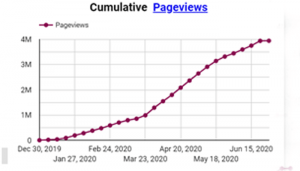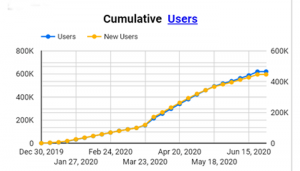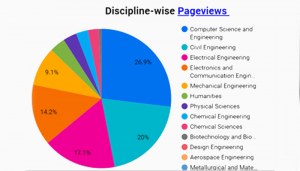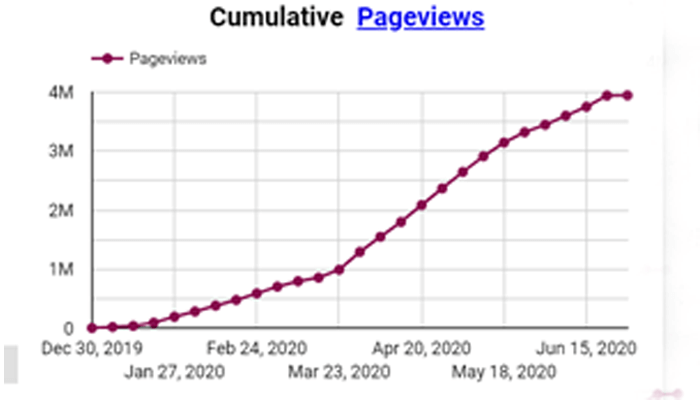Even as the Covid-19 situation reignites the great debate about the merits and demerits of streamed education, a government initiative under the National Mission on Education through ICT has been quietly witnessing a rising uptake. Read on to learn about the International Institute of Information Technology Hyderabad’s (IIITH) role in this effort.
Analytics from the Virtual Labs initiative released by the International Institute of Information Technology, Hyderabad has shown an increasing trend in the usage of Science and Engineering-related online laboratory materials over the last 6 month-period. Coinciding with the imposition of the lockdown in India, statistics show a steep trajectory in the cumulative page views of the materials – from 628,300 on March 25th to nearly 4 million as on June 29th. “Thanks to the recent Covid-19 situation, we’ve seen a surge in the number of usages. In fact you can see that (surge) around April 1st. It just tells us how important these virtual labs are for students across the country and also across the world”, says Dr. Venkatesh Choppella, Principal Investigator (PI) for Virtual Labs, IIITH. For users across the world, he is referring to the US, Colombia, the UAE, Philippines and Malaysia who are currently some of the leading non-Indian users contributing to more than 15% of the total usage.

Project And Portal
From providing remote access to labs to a complete learning management system, the Virtual Labs initiative of the Ministry of Human Resource Development (MHRD) includes additional web-resources, video-lectures, animated demonstrations and self evaluation for undergraduate and postgraduate students as well as research scholars. This digital project which was officially kicked off in 2012 to make accessible high quality and expensive equipment to all those constrained by time, geography, and sufficiently trained teachers, sees the participation of six IITs along with other institutes such as the IIITH, Amrita Vishwa VidyaPeetham, College of Engineering, Pune, Dayalbagh Institute, and NIT Surathkal. In addition to creating content, the team at IIITH under the Virtual Labs Engineering, Architecture and Design (VLEAD) is also primarily responsible for developing and maintaining the central engineering platform which hosts over 1000 experiments created by the partner institutes. “All the backend infrastructure that is required for the Virtual Labs – the hosting, the analytics, and the UI – all this is done by IIITH. We’re also maintaining the Outreach portal which gives information on the workshops and other outreach activities,” says Dr. Choppella.
Outreach During Covid-19
Typically, the outreach strategy adopted for propagation of online lab usage is the ‘push’ mode where the team reaches out to institutions across the country by conducting workshops to enhance student participation. However with the current situation, there has been a shift towards the “pull” mode. “It is physically impossible to go to colleges now. So we’ve had to rely on students going to the (Virtual Labs) website, discovering and using it without any intervention from us. The numbers on the graph (from April onwards) are entirely pull-based,” says Dr. Choppella. With many colleges still unaware of and not making use of these online resources, current outreach efforts through a webinar mode, in the absence of a physical presence, are being explored.
Labs In The Forefront
In keeping with IIITH’s core focus on Computer Science and Electronics, the labs developed by this institute are mainly related to Problem Solving, Data Structures, VLSI, Language Processing, Pattern Recognition, Artificial Neural Networks, among others. Interestingly, many of these feature in the top 10 labs listed by number of users. The Computer Programming and Data Structures labs, both built by IIITH are in the Top 10 most popular labs with a combined usage of over 225,000.

IIITH’s Early Association
Recollecting the history of the Virtual Labs effort in the country and in IIITH, the Director of IIITH, Prof. P.J. Narayanan says,”Prof. Jayanthi Sivaswamy was onto similar work for school children from way back in 2003 or 2004. The Phase 1 of MHRD-funded Virtual Labs project under the National Programme on Technology and Enhanced Learning (NPTEL) scheme came about in circa 2009, with Jayanthi as the Principal Investigator for IIITH”. Terming it as a big project in which IIITH was tasked to develop around 20 courses in Computer Science, Electronics and Communication, Civil Engineering, Sciences, and others, he says that the project was an “economic stimulus” to the IIIT research ecosystem. The task was divided among 25+ faculty members, with a budget of Rs 15 lakh to develop a single lab. It was the first truly Community Project in the institute, benefiting the research of many faculty members. Though the faculty committed to develop 20 virtual labs, they ended up working on 35 or more with a goal to be the national leaders in the virtual experiments space. “The lead position we are in is a direct consequence of that, which also helped many more faculty members to participate and advance their research,” says Prof. Narayanan.

National Success Story
Long before BYJU’s or upGrad came on the scene, the Virtual Labs project created and gave access to learning resources for all Engineering and Science students. Understandably for the institute, the current data is a matter of pride that the project has continued momentum with sustained effort. “Clearly, Virtual Labs is poised to become a national success story for India’s engineering education system in the months to come. With a bit more of a strategic push, we could be leading the world in this,” says Venkatesh optimistically, adding that for IIITH, “These virtual labs could be important assets and key differentiators for our education programmes.”



Next post